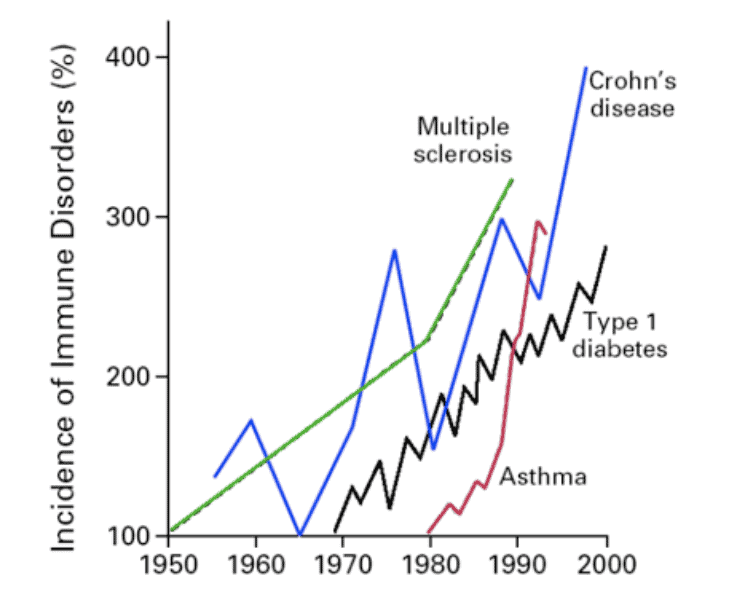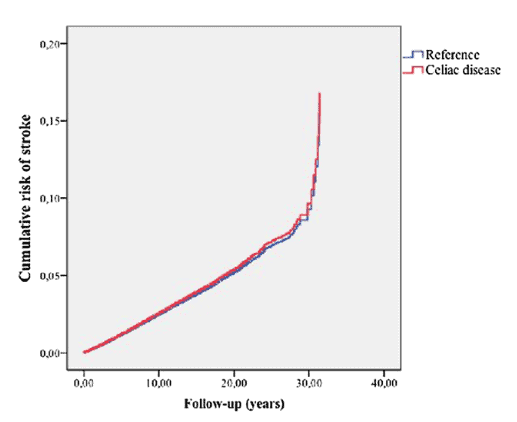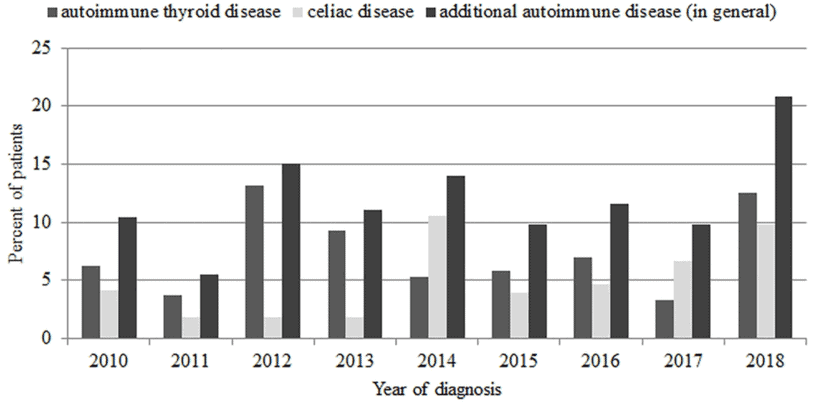
Carly Hanna
BSc (Human Nutrition and Psychology)
In the previous article we discussed several health conditions that can occur due to inflammation caused by coeliac disease.
Today, we’ll look closely at:
- secondary lactose intolerance
- multiple sclerosis and neuropathy
- cardiovascular disease
- thyroid disease
- type 1 diabetes
- intestinal cancer
and see the incidence of these health conditions in individuals diagnosed with coeliac disease.
Secondary lactose intolerance
Being intolerant or allergic to gluten is also likely to mean that we are intolerant or allergic to lactose (dairy) as well.
Since the digestive system is inflamed and unable to digest certain nutrients, eating dairy products can cause a flare up of coeliac symptoms.[1]
Eating dairy might be an issue
Once following a gluten-free diet, the secondary lactose intolerance may resolve if the small intestine repairs the damage from the coeliac disease.
Multiple sclerosis and neuropathy
Coeliac disease can be associated with neurological symptoms due to a breakdown of the nervous system.
Neuropathy is a term for health conditions that involve damage to the peripheral nerves. This can often include arms and legs and produce symptoms of numbness and tingling in these areas.
Multiple sclerosis is a condition where the immune system attacks the protective layer around nerves in the brain and spinal cord.[2]

Source: Fasano, A. Why Are Celiac Disease and Gluten Sensitivity on a Rise? (2014)
It can produce symptoms such as:
- tingling or numbness
- vision disturbances
- dizziness
- slurred speech
- lack of coordination and muscle weakness
- headaches
- tremors
Multiple sclerosis and neuropathy are more likely in a coeliac population than a non-coeliac population.[1]
Evidence shows that of those with multiple sclerosis, around 11% also had a coeliac disease diagnosis.[3]
Cardiovascular disease
Cardiovascular disease is the term for a range of conditions that affect the heart and/or blood vessels. This can include coronary heart disease, cardiomyopathy, heart failure, and heart arrhythmias.
Evidence shows that coeliac disease is associated with a 27% increased risk of cardiovascular disease compared to those without coeliac disease.[4]
Coeliac disease increases the risk of CVD by 27%

Source: Ludvigsson, J. Risk of Stroke in 28,000 Patients with Celiac Disease: A Nationwide Cohort Study in Sweden. (2012).
Inflammation is also believed to be a mediator of the relationship between coeliac disease and cardiovascular disease – meaning that the higher the inflammation in the body, the higher the risk of cardiovascular disease.[4]
Heart complications from coeliac disease have shown to increase with the severity of the coeliac disease and if it goes untreated.
The good news is that a gluten-free diet can reduce inflammation and lower the risk of cardiovascular disease.[4]
Thyroid disease
Thyroid disease is a condition where the immune system attacks the thyroid gland, resulting in the inability to produce the right amount of the thyroid hormone.[1]
Thyroid hormone is important for several bodily functions, metabolic processes and is also important for growth and development.
Not having enough thyroid hormone can lead to Hashimoto’s disease, which is an autoimmune disease that is often associated with coeliac disease.
Type 1 diabetes
Type 1 diabetes is an autoimmune condition where the body is unable to produce insulin to regulate blood sugar levels.
This is different to type 2 diabetes, which is not an autoimmune condition but more of a condition caused by the interaction between genetics and environmental/lifestyle factors.
Type 1 diabetes is more likely to be diagnosed in childhood and young adulthood, whereas type 2 diabetes can occur at any lifestage.
RELATED — Type 1 Diabetes: Autoimmune disease that is on the rise
There is approximately 6% patient overlap between type I diabetes and coeliac disease.[1,6]
There is no link between coeliac disease and type 2 diabetes, however, comorbidities of these conditions can still occur.

(thyroid disease and coeliac disease) in new-onset type 1 diabetes
Other autoimmune conditions
Type 1 diabetes and thyroid disease are the most prevalent autoimmune conditions that are associated with coeliac disease.[5]
However, there are also other autoimmune conditions that can occur when diagnosed with coeliac disease, such as:
- Lupus (condition where the body attacks healthy tissue and organs)[1]
- Alopecia (condition where hair loss can occur anywhere on the body, and can vary in severity)[1]
- Sarcoidosis (condition that causes scar tissue to form on the lungs and lymph nodes)[1]
- Rheumatoid arthritis (condition that causes inflammation in joints such as hands, feet, knees, wrists, elbows, and ankles)[5]
- Autoimmune hepatitis (condition where the body’s immune system attacks and damages the liver)[5]
- Psoriasis (a skin condition that causes rashes)[5]
- Crohn’s disease (condition where the immune system attacks the gastrointestinal tract)[5]
The risk of developing other autoimmune disorders increases with the time it takes to diagnose coeliac disease, as shown in the table below.
Age of diagnosis (years) | Chance of developing another autoimmune disorder |
2–4 | 10.5% |
4–12 | 16.7% |
12–20 | 27% |
20+ | 34% |
Intestinal cancer
The overall risk of developing cancer from coeliac disease is quite rare, but does exist – with approximately 0.1%–3.2% of all coeliac disease patients have developed non-Hodgkin’s lymphoma.[7]
This is a type of cancer that forms in the lymphatic system can spread throughout the body, if not recognised and treated early.
This can also lead to intestinal lymphoma, which is when large masses are found in the intestine. These masses can be malignant (cancerous) or benign.[7]
Enteropathy-associated T-cell lymphoma (EATL) and adenocarcinoma are the other intestinal cancers most associated with coeliac disease.[8]
The link between coeliac disease and these types of cancers are due to the autoimmune response that is associated with coeliac disease. Other risk factors, that apply to non-coeliac patients as well, include:
- obesity
- smoking
- alcohol consumption
- exercise
- diet
If you follow a gluten-free diet, the risk of these types of cancers can be the same as someone who doesn’t have coeliac disease.[9]
Related Questions
1. Can the carnivore (nose to tail) diet help with symptoms and management of coeliac disease?
Carnivore diet can provide a rich source of nutrients and reduce inflammation in those with coeliac disease.
However, it is also important for those with coeliac disease to include fibre rich foods such as fruits and vegetables.
2. Does fibre present an issue with digestion in individuals with coeliac disease?
While fibre is common in gluten containing foods, it is especially important for those with coeliac disease to get enough of it.
An increased fibre intake has shown to help with coeliac disease symptoms.[10] Gluten-free sources of fibre include beans, leafy greens, corn, broccoli, sweet potatoes, and brown rice.
3. Is A2 milk from sheep and goat safe to consume if I have coeliac disease?
Some people can tolerate sheep and/or goat milk better than A2 dairy milk, due to the lower amounts of casein (which can mimic gluten in the gut).[11] Have you tried non-homogenised goat and sheep milk yet? If so, let us know in the comments below and also what benefits you’ve noticed.
Having passion for mental health and nutrition, Carly’s goal is to become a registered psychologist with a focus on self-care – food, exercise, and sleep. She has a special interest in various mental health disorders, plant-based diets, and the relationship between food and mood…
If you would like to learn more about Carly, see Expert: Carly Hanna.
References
(1) Associated Conditions. Coeliac Australia. Accessed online 16/04/23.
(2) Celiac disease and multiple sclerosis. Beyond Celiac. Accessed online 16/04/23. Retrieved from https://www.beyondceliac.org/celiac-disease/related-conditions/multiple-sclerosis/
(3) Rodrigo L, Hernández-Lahoz C, Fuentes D, Alvarez N, López-Vázquez A, González S. Prevalence of celiac disease in multiple sclerosis. BMC neurology. 2011 Dec;11(1):1-7. https://bmcneurol.biomedcentral.com/articles/10.1186/1471-2377-11-31
(4) Conroy M, Allen N, Lacey B, Littlejohns T. Association between coeliac disease and cardiovascular disease: a prospective analysis in UK Biobank. BMJ medicine. 2023 Jan 30;2(1). https://bmjmedicine.bmj.com/content/2/1/e000371
(5) Autoimmune Disorders. Celiac Disease Foundation. Accessed online 16/04/23. Retrieved from https://celiac.org/about-celiac-disease/related-conditions/autoimmune-disorders/
(6) Głowińska-Olszewska B, Szabłowski M, Panas P, Żoła̧dek K, Jamiołkowska-Sztabkowska M, Milewska AJ, Kadłubiska A, Polkowska A, Łuczyński W, Bossowski A. Increasing co-occurrence of additional autoimmune disorders at diabetes type 1 onset among children and adolescents diagnosed in years 2010–2018—single-center study. Frontiers in endocrinology. 2020 Aug 6;11:476. https://www.frontiersin.org/articles/10.3389/fendo.2020.00476/full
(7) Laurikka P, Kivelä L, Kurppa K, Kaukinen K. Systemic consequences of coeliac disease. Alimentary Pharmacology & Therapeutics. 2022 Jul;56:S64-72. https://onlinelibrary.wiley.com/doi/full/10.1111/apt.16912
(8) Celiac Disease and Cancer. Beyond Celiac. Accessed online 16/04/23. Retrieved from https://www.beyondceliac.org/celiac-disease/related-conditions/cancer/#:~:text=There%20are%203%20types%20of,celiac%20disease%20is%20quite%20rare.
(9) Coeliac Disease – Complications. NHS. Accessed online 16/04/23. Retrieved from https://www.nhs.uk/conditions/coeliac-disease/complications/#:~:text=Someone%20with%20coeliac%20disease%20has,bowel%20lymphoma%20and%20Hodgkin%20lymphoma.
(10) Laurikka, Pilvi MD; Lindfors, Katri PhD; Oittinen, Mikko MSc; Huhtala, Heini MSc; Salmi, Teea MD, PhD; Lähdeaho, Marja-Leena MD, PhD; Ilus, Tuire MD, PhD; Mäki, Markku MD, PhD; Kaukinen, Katri MD, PhD; Kurppa, Kalle MD, PhD. Dietary Factors and Mucosal Immune Response in Celiac Disease Patients Having Persistent Symptoms Despite a Gluten-free Diet. Journal of Clinical Gastroenterology 53(7):p 507-513, August 2019. | DOI: 10.1097/MCG.0000000000001013
(11) Compton, Georgia. What you need to know when going gluten or dairy free. Nourish to flourish. 10 Nov 2022. Accessed online (17/04/23). Retrieved from https://www.nourishtoflourish.co.nz/post/what-you-need-to-know-when-going-gluten-or-dairy-free






